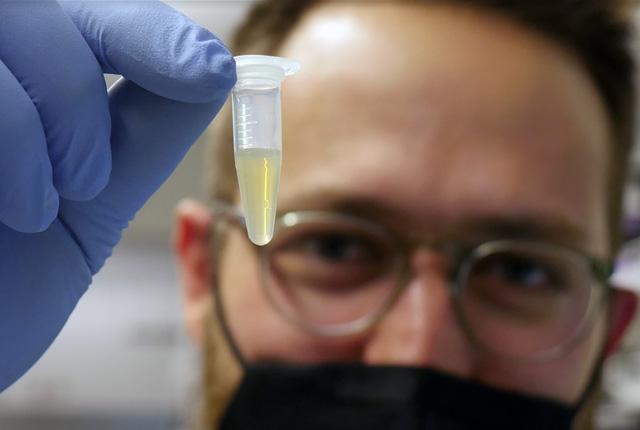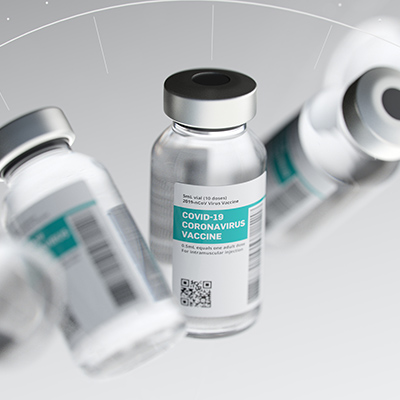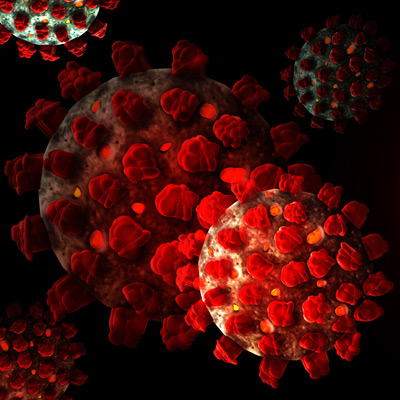July 21, 2020 -- A replicating RNA vaccine delivered with a lipid-based nanoparticle emulsion has been shown to produce potent antibodies against SARS-CoV-2 in mice and primates with a single immunization, according to a study published in Science Translational Medicine on July 20.
One way to protect against SARS-CoV-2 is through the production of antispike protein antibodies. Furthermore, type 1 T-helper cell (Th1)-based vaccine immune responses have also been shown to protect against lung disease. Therefore, the researchers set out to design a vaccine that induces Th1 immune responses made of SARS-CoV-2-specific neutralizing antibodies.
Nucleic acid vaccines have emerged as ideal vaccine candidates that do not require pathogen culture or recombinant protein production. However, messenger RNA (mRNA) and DNA vaccines may not be efficacious after a single immunization, as they are susceptible to degradation. Consequently, these vaccines often require extremely high dosing.

"A vaccine that can stop COVID-19 will ideally induce protective immunity after only a single immunization, avoid immune responses that could exacerbate virus-induced pathology, be amenable to rapid and cost-effective scale-up and manufacturing, and be capable of inducing immunity in all populations including the elderly who typically respond poorly to vaccines," said senior author, Deborah Heydenberg Fuller, PhD, professor of microbiology at the University of Washington, in a statement.
Overcoming high dose requirements
An alternative to mRNA and DNA vaccines is the virus-derived replicon RNA (repRNA) vaccine, which has an intact open reading frame encoding the viral RNA polymerase complex, but with the structural protein genes replaced with an antigen-encoding gene. This ensures ongoing biosynthesis of antigen-encoding RNA that results in a dramatically increased expression and duration of immune responses. The repRNA acts as its own adjuvant, eliciting more robust immune responses after a single dose, compared to conventional mRNA, which requires multiple, 1,000-fold higher doses.
Researchers at the University of Washington in collaboration with HDT Bio developed an alphavirus-derived replicon RNA vaccine candidate, repRNA-CoV2S, which encodes the SARS-CoV-2 spike protein. The RNA replicons were formulated with lipid inorganic nanoparticles (LION), which enhance vaccine stability, delivery, and immunogenicity. The researchers believe that this cell-free vaccine could induce protective immunity after only a single dose, making scalable manufacturing easier for the billions of doses needed.
The two-vial approach
The vaccine is composed of two vials, one containing the LION formulation, and the second containing the repRNA vaccine. The independent solutions can be manufactured and stockpiled separately, and then combined on site prior to use. Once mixed, the vaccine is stable for at least one week at room temperature, according to the authors.
"RNA molecules are highly susceptible to degradation by enzymes," explained lead formulation developer, Amit P. Khandar, PhD, of HDT Bio. "LION is a next-generation nanoparticle formulation that protects the RNA molecule and enables in vivo delivery of the vaccine after a simple mixing step at the pharmacy."
The researchers demonstrated that the LION/repRNA-CoV2S vaccine induced robust neutralization of SARS-CoV-2 in vaccinated mice and macaques that lasted for at least 70 days post-vaccination. They suggest that the lasting effect may be due to sustained antigen expression mediated by the repRNA.
The vaccine also induced modest but detectable spike-specific T-cell responses and immunoglobulin G (IgG) antibody isotypes indicative of a Th1 cell response. The antibody titers produced were comparable to those found in convalesced COVID-19 patient serum. The long-term protection provided by memory T-cell responses observed were similar to other viral-vector vaccines that are currently under development.
Protecting diverse populations
Vulnerability to COVID-19 increases with age, therefore developing vaccinations to protect the older population is crucial in the fight against the pandemic. This can be a difficult objective, as elderly individuals are less likely to respond to vaccination due to their aging immune system.
The research team was encouraged by the results from challenged mice models. When the vaccine was testing in young (two- and eight-month-old) and aged (17-month-old) mice, the researchers found that prime-only immunization in aged mice induced smaller immune responses compared to young mice, however this was ameliorated with a booster immunization. The results suggest that the vaccine could be effective, even in high-risk populations.
The researchers are planning to advance the vaccine candidate, under the name HDT-301, to clinical development to induce rapid immune protection from SARS-CoV-2 infection.
Do you have a unique perspective on your research related to vaccines or immunology? Contact the editor today to learn more.
Copyright © 2020 scienceboard.net









